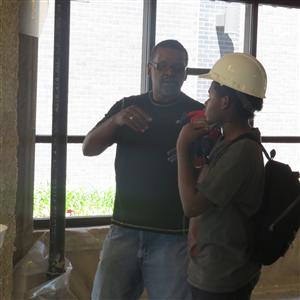Restoring the Black Middle Class: Evolution of Manufacturing Jobs Requires Shift in Skill Focus
FOR IMMEDIATE RELEASE
March 3, 2017
CONTACT:

CHICAGO, IL. – March 3, 2017 –The Chicago Urban League’s Workforce Development Director Andrew Wells today issued the following statement in response to the Bureau of Labor Statistics (BLS) February 2017 jobs report:
Despite a national economic recovery and a steady unemployment rate of 4.7 percent, people of color in most American cities, especially Chicago, continue to suffer from growing economic and social disparities. With an unemployment rate more than triple the national average, many African Americans in Chicago who live in neighborhoods that are impoverished with unfavorable social conditions often see no evident path to a better quality of life. Meanwhile, manufacturing jobs, once a prominent foundation for the middle class, are being heralded as the silver bullet solution that promises to save the middle class and serve as a lifeline to those in economic despair. Let’s think about this for a second.
According to data published by the Bureau of Labor Statistics, manufacturing employment peaked in 1979, where 18.9 million jobs existed. During the same year, the national unemployment rate was 5.9 percent; the unemployment rate for Blacks was 12.3 percent. The 1980s ushered in an unprecedented wave of job loss. From 1980 to 2005, the U.S. lost 4.5 million manufacturing jobs, which at the time, was equivalent to 24 percent of its manufacturing employment, according to Brookings Institute. The sector has been transforming ever since.
Advancements in technology are reducing the number of available jobs in the manufacturing industry overall, and it is unlikely that we will see 18 million jobs again. The sector has moved toward automation, robotics and advanced manufacturing, which requires a different skill set.
“Workers will need to engage in continuous learning to stay up on the current technology trends,” said Haven Allen, Executive Director of mHUB, Chicago’s first innovation center focused on physical product development and manufacturing.
mHUB exists to ensure that Chicago and the manufacturing industry in America’s heartland continues to accelerate, grow and thrive.
“Labor intensive and low-skilled jobs have left the U.S. and are likely to not come back,” said Allen. “Some will be retained as this transition will occur over decades. Even if the production of goods returns, the jobs will be completed through more automation.”
The strengthening of the middle-class and the rejuvenation of Black communities can be realized when we apply a greater focus on STEM (Science, Technology, Engineering, and Mathematics) education in our schools as well as through job training, like many programs at the Chicago Urban League.
Jen Guarino, VP Manufacturing at Shinola added, “Today’s best manufacturing jobs now often require computer and technology knowledge to accompany traditional skills. There is a convergence of new and traditional skills in a way that neither technology nor skilled labor can cover alone.”
Although the manufacturing industry itself isn’t necessarily growing, the rapid job boon stems from baby boomers who are retiring. Meanwhile, employers are having a hard time filling the gap left by this exodus.
According to Guarino, there are more job openings than manufacturers can fill – 353,000 per month on average in 2016.
STEM education is key in getting these jobs filled and sparking the rebound of the Black middle class.
###
To schedule an interview with Mr. Wells, please email cwhittington@thechicagourbanleague.org.
About the Chicago Urban League
Established in 1916, the Chicago Urban League works for economic, educational and social progress for African Americans and promotes strong sustainable communities through advocacy, collaboration and innovation. For more information, visit www.thechicagourbanleague.org. Find us on Facebook and follow us on Twitter.
